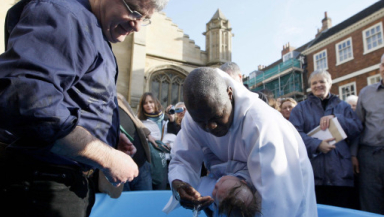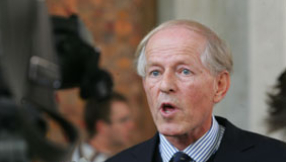
There are mixed feelings in the Church of England over a proposed alternative baptism service.
Alternative wording is being trialled across 400 parishes until Easter. Rather than replacing the existing liturgy, the new version, if approved, would be offered as one of a number of options parents would be able to choose at their child's baptism.
The proposal has been brought forward in response to requests for materials to supplement the baptism service "in culturally appropriate and accessible language".
General Synod would have to approve the alternative wording before it could come into effect.
The omission of traditional references to "sin" and "the devil" as well as the Apostles' Creed has been met with criticism by the former Bishop of Rochester, the Right Reverend Michael Nazir-Ali.
Instead of being asked "Do you reject the devil and all rebellion against God?", parents and godparents would be asked whether they "reject evil, and all its many forms, and all its empty promises".
The question "Do you repent of the sins that separate us from God and neighbour?" is completely removed.
Bishop Nazir-Ali suggested the changes amounted to "dumbing down" the baptism service and making light of its fundamental meaning.
"Because of its anxiety to make everyone feel welcome and its desire not to offend anyone, the new service, almost entirely, does away with sin and the need to repent from its personal and social manifestations and consequences," he said.
"The whole thrust of the service of deliverance from sin, protection from the devil and regeneration by water and the Holy Spirit, based on the teaching of Jesus himself, has been set aside and replaced by a 'welcome' which seems to have no basis in the promises of God, the faith of the parents and godparents or of the Church as a whole."
A senior member of the General Synod who wished to remain anonymous was quoted in the Daily Mail as saying that "large parts of the Church of England don't believe in hell, sin or repentance".
"They think you can just hold hands and smile and we will all go to Heaven. That is certainly not what Jesus thought," the Synod member said.
"A humanist could say 'I renounce evil'. If you take out repentance you immediately strike at the heart of the whole idea of needing to be baptised."
Alison Ruoff, a lay member of the Synod, was quoted as suggesting the new wording lacked conviction: "By removing all mention of the devil and rebellion against God, we are left to our own vague understanding of what evil might or might not mean."
The Right Reverend Stephen Platten, the Bishop of Wakefield, has defended the proposals and rejected the notion that the Church of England is dumbing down the baptism service.
Talking to Christian Today, Bishop Platten said there were concerns that references to the devil could be mistaken as implying an equality with God.
There was also the danger of individuals overlooking personal responsibility for their actions, he said.
"Evil is something we ourselves have responsibility for."
The bishop emphasised the need for people participating in the baptism service to understand what was being said.
"We need to use language that people understand," he said.
He added: "You do not have to have the whole of Christian doctrine in every part of the service."
Reverend Olaf Eriksson, of St Luke's Parish Church in Sunderland, told Christian Today that the debate and the comments around it have become "somewhat over the top".
"The Church has always tried to change the language of its own rites to make them relevant in its own time," he said.
Reverend Eriksson said that if anything the alternative wording was "slightly repetitive", but he remained unconcerned about the prospect of it being made available, saying that ideas of sin, evil and the devil would become the reality for anyone entering the church and would "not disappear whether we change the language [in the baptism service] or not".
The Reverend Tracey Bateson, of St Mary Magdalene with St Lawrence, Davington, said there was a need for balance.
She said: "We indeed today face a challenge of not wanting to lose the true meaning of baptism while at the same time wanting to attract more people to church. Our churches attract many non-churchgoers who wish to have their children baptised."













